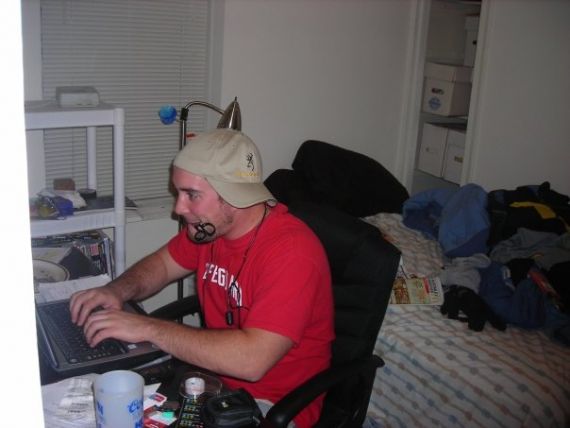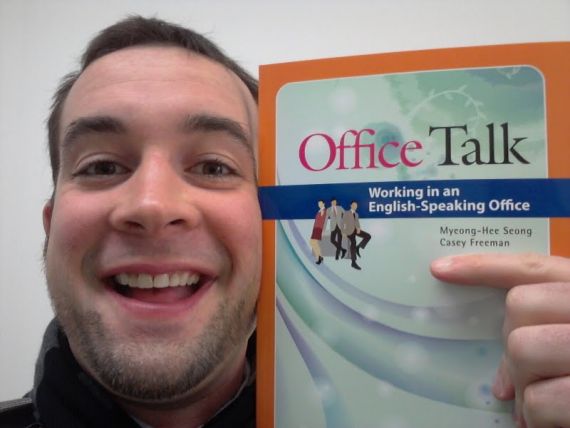 (The master writer hard at work.)
(The master writer hard at work.)
As a four-year-old, I fondly remember telling my Grandma a story about a mean monster who said bad words, destroyed the city and ate some people. Just when the story started getting good, I was getting tired. So I abruptly ended the story with: "Then the monster melted."
My Grandma, as grandmas do, loved my story. Since that night I've never forgotten how stories capture people's attention, entertain them, make them happy or sad and can even change the world. So when I grew up I wanted to be only one thing: a firefighting ninja dinosaur astronaut. I also wanted to be a writer.
Being a writer and writers in general are weird. It's hard to be a successful writer, but easy to become one. All you really need to do to be a writer is find a napkin and scribble some words on it. Boom! You're a writer!
There are all types of writers. Romance novel authors, journalists, bloggers, recipe creators, diarists, advertisers, blurbers, poets, singer-songwriters and who knows what else. I dreamed of being the coolest and most famous and awesomest science fiction author. People would say, "KC Freeman is just as talented and cool and groundbreaking as Stan Lee, J.J. Abrams, Stephen King and George Lucas."
To chase my dream I made the big move from North and South Dakota to New York City. I studied at New York University. I interned at Marvel Comics. I kept a journal. I interviewed people for a now-defunct website called www.2zero.com (which may or may not still exist, I just don't feel like checking it out because I'm kind of on a writing binge.) Seeing my name on top of an article that people actually read made me so proud. And my Grandma too because I printed it out and mailed it to her.
All of this was hard, but some of the most fun I've ever had whilst struggling.
Then I realized the real hard part of writing. Getting a job. Nobody really hires writers. Not unless you've got a name for yourself. I didn't. The only way to get a name was to write, but it's hard to write when nobody hires you. Boo hoo. So I worked some sucky jobs.
While lifeguarding, I met a guy who knew a guy who worked in movies. He bought some of my ideas and I wrote the worst screenplay in the history of the world. It turns out this guy was full of shit and nobody ever saw my movie or read my stuff. Oh well. There was always lifeguarding.
So after some failed jobs and more sucky jobs, I started grad school at the University of Colorado to learn how to be a journalist. It's how Ernest Hemingway, Mark Twain and Hunter S. Thompson all got their starts. I started writing for the Colorado Daily, where I learned more about writing than any of my other training. I learned how to try to make boring stories interesting. Finding scuttlebutt (little pieces of information that lead to a story). And pumping out a story every day. Sometimes two or three or four stories.
I collected clippings of my stories and sent them to my Grandma, who was so happy and proud of me. You've got to love grandmas, they're the best fans in the world.
In an effort to better myself and my career, I moved to the Greeley Tribune for a while. A better newspaper, but a less fun experience. After that, back to the Daily. Then I decided Colorado wasn't big enough for me, so I took my shot at NYC again and started a magazine job at Real Estate New York—the least interesting publication in the world. When I mailed my Grandma these stories she said, "You know, go ahead and don't send any more. Save your postage."
This magazine was so boring and the workload so easy, I found myself writing things I thought were funny. On a chance, I e-mailed Fearless Editor Court Sullivan of Points In Case who loved me and my stupid stories and I started another part of my writing career—Internet columnist, blogger and humorist. Again, my name at the top of articles caused me great joy.
The people who read and commented made working an awful job so I could support my writing hobby even more worthwhile. Being that most of my stories centered around sex, drinking and fighting, I decided to just tell my Grandma, "I write stuff for the Internet." Again, she beamed with pride and joy.
One fateful night while on vacation, I broke my neck. It was pretty bad. So bad that Real Estate New York decided to lay me off. So it was back to working sucky jobs. In the meantime, I did more PIC work, and even found a few other gigs for stuff like Glamour magazine's online site and some drinking websites. You write what you know.
Again, somebody asked me to write a book for them. This time somebody from a humor publisher. A real publisher! He wanted a book about my life working sucky jobs. I flew to NYC to meet him. He wined and dined me. He told me I could be the next Tucker Max or Maddox. So I poured my life, guts and stories into this book. And never heard from him again.
Thus, I worked more sucky jobs and wrote for the Internet, but it just wasn't doing anything for me so I moved to Korea to start another career: teaching. It turns out I love teaching as much as I love writing. Who knew? As a result, I penned a lot of stuff about the oddities of living in Korea, cute kid stories and drinking adventures. Later, I upgraded my life to a professor.
At the university, I don't have so many cute kids and booze stories, but I kept on telling the Internet some of my tall tales and stupid shenanigans. Lo and behold, the dean of the English department asked me to pen yet another book. This time, a textbook for college students. I put everything I knew to work and pumped out a textbook.
I didn't tell too many people about it. I'd had my writing heart broken twice already. I didn't want anybody to know about this until my book really happened.
The other day, it really happened.
 (The author and his product.)
(The author and his product.)
Now in Korean university bookstores, you can find "Office Talk: Working in an English-Speaking Office" by Casey Freeman. My name in print. Maybe parents of children understand. Maybe artists, inventors, songwriters, fashion designers, actors and actresses, directors, video game makers or chefs. But wow. To see your name on something like this that you worked so hard for is—for lack of better words and my appreciation of clichés—the best feeling in the world.
My signed first copy is in the mail to, of course, my Grandma. The next to my Mom. Even though they both can speak English, I'm sure they will love it and be so happy and tell their friends about their little baby who wrote a book. And that's worth all the failed attempts in the world. I couldn't have done it without them. Also, I couldn't have done it without Court, PIC and you—the readers at home. Or work or wherever you choose to read my stuff.
"Office Talk" isn't the next great American novel. It's not the next "Lord of the Rings" or my science fiction masterpiece. Teenage girls aren't going to camp outside of Barnes & Noble as they giggle, wait and cry for me to autograph their dog-eared copies of the book I wrote just like they do with "Twilight" and "Harry Potter." I'm not going to get loads of mail asking me for career advice or praising me for the gift of knowledge I've given.
"Office Talk" is just a textbook. But it's not just a textbook. It's a part of me. Maybe there are some mistakes, maybe only a few hundred copies will be sold and maybe somebody will write a better version, but this is mine.
Right now, I'm still on Cloud 9000. I'm so happy. I can't wait until I punch out another book and see my name in print again. What will it be next time? Who knows? Now, I'm re-inspired to work on that bartending book. My sci-fi extravaganza. My "LOTR." My collection of stories not really fit for PIC. My next textbook idea.
Whichever which one it is, I'm excited. I didn't start my writing career to be a textbook writer in Korea, but that's where my journey took me. I couldn't be here without all my teachers, editors, readers, fans, haters, friends, family and of course my Grandma.
But now I'm tired, and this monster is melting.
